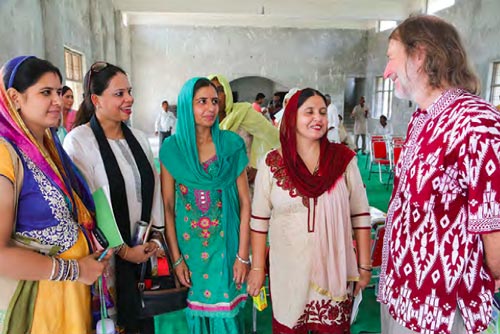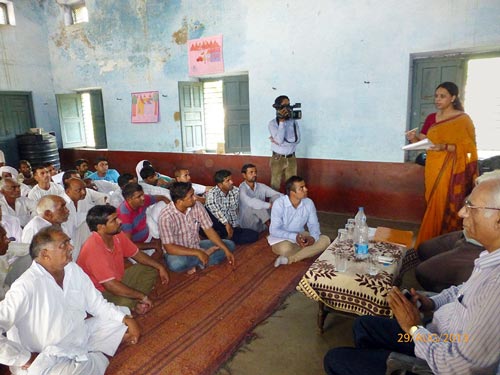ML Jat, Tripti Agarwal, Surabhi Mittal
The CGIAR Research Program on Climate Change, Agriculture and Food Security (CCAFS) management team lead by Bruce Campbell, Director, CCAFS, visited CIMMYT-CCAFS action sites in India during 23-28 August. The primary objectives of this visit were to see the conceptual framework of Climate Smart Villages (CSVs) in action, the innovative partnerships and policy-level influence for developing and scaling-up climate-smart agriculture in India to replicate the CSVs in other regions of the world. During the visit, an interface was organized for the current and future collaborative work in India between the Indian Council of Agricultural Research (ICAR) and CCAFS. Informed about CCAFS’ progress, the team headed for CSVs managed by CIMMYT in Karnal, Haryana on 25-26 August.
There are 27 CSVs; to initiate knowledge sharing, the team traveled to Anjanthali, Beernarayana and Taraori as well as other research sites. The team was welcomed with garlands to honor their work facilitating farmers’ actions to address climate change and enhance productivity. Interactive discussions with the team, scientists, farmers and partners occurred throughout the trip. A brief was presented on CSVs in Haryana and the climate-smart agricultural practices (CSAPs) being undertaken, both technological and mechanical. Farmers illustrated the laser levelers, turbo seeders and precision nutrient management. Moreover, they emphasized the importance of information and communications technologies (ICTs), which enable them to receive advance rainfall predictions.

In a stakeholder consultation involving CSV committee members, farmer cooperatives, national system partners and others, farmers described their experiences and benefits gained by adopting climate-smart technologies and practices. They also emphasized how farmer-to-farmer networking is helping in scaling-out this information. In a message from the State Department of Agriculture, Dr. Suresh Gehlawat, additional director, Haryana, validated the statement made by farmers based on his constant interaction with farmers and scientists to up-scale the activities and strengthen linkages. Dr. DK Sharma, director of the Central Soil Salinity Research Institute (CCSRI) at Karnal, explained CCSRI’s work in collaboration with the National Initiative on Climate Resilient Agriculture in India (NICRA) and CCFAS. CSSRI is developing salinity-tolerant varieties of basmati that can adapt to water reclamation. He also praised the CSV concept, and proposed that the techniques used by CSSRI can be linked with CSVs for better results.
Dr. Ishwar Singh, of CCS Haryana Agricultural University, applauded CIMMYT’s efforts to establish a capacity development platform for Ph.D. research students, who are conducting their research and also gaining practical knowledge and exposure. Campbell addressed the gathering, stating that the farming community plays a significant role in adapting to climate change and creating overall impact. He stated that–next to farmers–the most important part of the network is partnership with policymakers, and only then is the role of scientists accomplished.
John Recha, of the International Livestock Research Institute in Africa, was impressed with the efforts made by CSVs, and stated his intention to take information about the CSV model to his country; he hoped that farmers there can also reap the benefits of technological adoption and working in a collaborative model. Exchanging comments on climate change adaptation and its benefits, stakeholders expressed mutual satisfaction regarding commitments made for a sustainable future.
Work done on greenhouse gas (GHG) emission measurements under ICAR-CCAFS collaboration was explained by Dr. PC Sharma, Dr. HS Jat and Dr. Tek Sapkota, who described the CSSRI-CSISA platform. Dr. RC Upadhyay and Dr. AK Srivastava, director, National Dairy Research Institute (NDRI), Karnal discussed studies carried out on livestock, such as methane measurement, adaptation screening and other climate change facilities under the NICRA project, as a further scope of expansion under CCAFS. Next, a tree planting activity was conducted, symbolizing a greener future.
In a session organized by NDRI, Campbell made a presentation on challenges and opportunities in climate change, agriculture and food security. Adding to this, Dr. Philip Thornton, flagship 4 leader, CCAFS-ILRI, presented “Is the IPCC’s Fifth Assessment Report telling us anything new about livestock, climate change and food security?” In the open discussion, participants congratulated the team and asked about future action plans. Later, NDRI and the team formed a common platform to work in collaboration on a larger scale to address common issues.
To review the work on ICTs, the team visited Anjanthali to interact with women who are connected to M(obile)solution-CCAFS. Dr. Surabhi Mittal, a CIMMYT agricultural economist, Mr. Kamaljeet and Kisan Sanchar explained how messages are being delivered and how their efficient usage is ensured through proper monitoring software. Over 50 women participants presented their views in an interactive session, where they emphasized how access to information about climate-smart agriculture, weather information and conservation agriculture has enhanced their participation in household decision-making. Deissy Martínez Baron of the International Center for Tropical Agriculture (CIAT) interacted with women farmers and expressed the support the management team has for efforts made by farmers. Dr. M.L. Jat, CIMMYT-CCAFS South Asia coordinator, along with his colleagues and team, walked through the village of Taraori to witness the participatory strategic research on CSAPs and GHG measurements being taken. Dr. P.K. Aggarwal, regional program leader, South Asia International Water Management Institute (IWMI), monitored the visit and gave vital input.
After completing their visit, several members of the team sent complimentary emails. Campbell, in an email to the CCAFS contact point at CIMMYT, stated: “Just completed a great trip to India and some of the field sites. Especially had a great time with the CIMMYT team of ML, Surabhi, Tek and Jeetendra, amongst many others including the large numbers of students, partners and farmers. The work they are all doing is very impressive [in Karnal]. Very collaborative as well.” John Recha, participatory action research specialist, East Africa, said in an email, “I gained a lot of information from your team that I will implement in East Africa” and also noted that the communication materials will be used as resources, including the CSV profile, local language farm budget maintainence booklet and brochures developed by CIMMYT-IWMI. Leocadio Sebastian, regional program leader for CCAFS-Southeast Asia said in an email to Dr. P.K. Joshi, International Food Policy Research Institute, “I was also delighted to interact with you, Pramod and ML. I think we have lots to learn from your team in South Asia and I hope that bringing the Southeast Asia (SEA) team will help us jumpstart our work in SEA. The challenge to learn fast is with us and the South Asia team has set a very good model.” Also Andrew Jarvis, theme leader flagship 1 of CCAFs, wrote in an email to Dr. Jat, “I was seriously impressed with what I saw, and must say that you are doing a real dynamo job with the climate smart villages. It only reinforced the importance of you leading our FP1 projects in South Asia.”
The well-organized and appropriately precise visit enabled the stakeholders to demonstrate their commitment and future goals toward climate smart agriculture. The cross-world exchange of experiences and mutual learning strengthened the building blocks for scaling-up and scaling-out a concept for a better and more sustainable future of agriculture.

 Climate adaptation and mitigation
Climate adaptation and mitigation